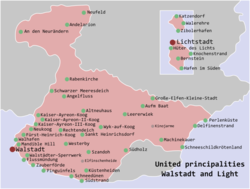Principality of Walstadt
| Principality of Walstadt, later the Enlightened Realm of Greater Walstadt | |||
| |||
| Motto: | |||
| Anthem: | |||

| |||
| Map versions | |||
| Capital | Walstadt | ||
| Largest city | Walstadt, Light | ||
| Official language(s) | Walstädtish, a dialect of South-Cibolan Saxon | ||
| Official religion(s) | Siseranism | ||
| Demonym | Walstädter | ||
| - Adjective | Walstädter | ||
| Government | Principality | ||
| - Fürst | Heinrich Blutwasser von Walstadt and his heirs | ||
| - Legislature | House of Nobility | ||
| Establishment | |||
| Area | |||
| Population | |||
| Currency | |||
| Calendar | |||
| Time zone(s) | |||
| Mains electricity | |||
| Driving side | |||
| Track gauge | |||
| National website | |||
| National forum | Forum | ||
| National animal | |||
| National food | Whale meat | ||
| National drink | Fürst Ludwig Bier | ||
| National tree | |||
| Abbreviation | |||
The term Principality of Walstadt refers to a specific period in the history of Walstadt, namely the period when it was ruled by the Blutwasser dynasty. Under the rule of Heinrich Blutwasser, who inherited the throne in 1624, Walstadt was transformed into a state where only the Saxon majority's rights were respected, at the cost of the rights of the Sangunese and Tapferite minorities. The Blutwasser's rule ended short after Fürst Theodor Blutwasser overplayed his hand by declaring independence from Natopia in 1637. Noted for its sensibly planned and methodically organised harbours and for being the site of several high-profile, sometimes improbable, executions and martyrdoms.
History
History begins when Ludwig von Blutwasser is adopted by Mirza Jonathan Merlingsson Ayreon-Kalirion, the Prince of Kujirashi-Walstadt. After the death of his adoptive father in 1624, Ludwig ascends the throne. At the time, the demesne's legislative powers are held by the House of Nobility, which is unlikely to support his agenda. Luckily for Ludwig, he has twenty-seven children who he all gives titles to create a family majority in the House of Nobility. With this newfound majority, the Prince swiftly introduced a new Instrument of Government, in which all legislative power was moved to the Prince, with the House of Nobility only becoming an advisory council.


